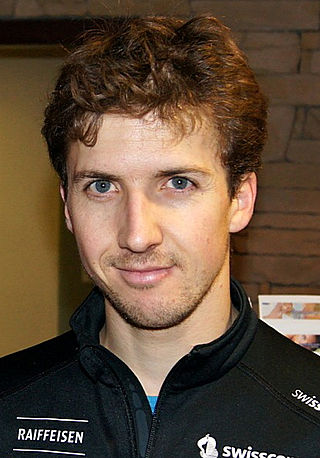
Simon Ammann is a Swiss ski jumper. He is one of the most successful athletes in the history of the sport, having won four individual Winter Olympic gold medals in 2002 and 2010. His other achievements include winning the 2007 Ski Jumping World Championships, the 2010 Ski Flying World Championships, the 2010 Nordic Tournament, and the 2010 Ski Jumping World Cup overall title.

Matti Ensio Nykänen was a Finnish ski jumper who competed from 1981 to 1991. He is one of the most successful ski jumpers of all time, having won five Winter Olympic medals, nine World Championship medals, and 22 Finnish Championship medals. Most notably, he won three gold medals at the 1988 Winter Olympics, becoming, along with Yvonne van Gennip of the Netherlands, the most medaled athlete that winter.

Bjørn Tore Wirkola is a Norwegian former ski jumper.
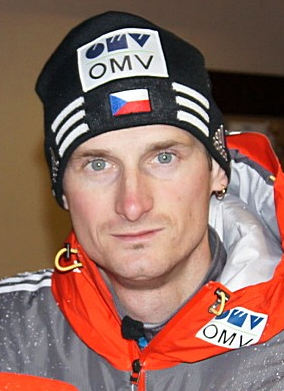
Jakub Janda is a Czech politician and former ski jumper. In ski jumping he competed from 1996 to 2017, winning the gold medal in the 2005–06 FIS Ski Jumping World Cup as the 2006 World Champion. He also won the 2005/06 Four Hills Tournament, as well as silver and bronze medals at the 2005 World Championships. Janda is one of the most successful ski jumpers from the Czech Republic, and is the only Czech World Cup champion to date.

Heini-Klopfer-Skiflugschanze is a ski flying hill in Oberstdorf, Germany. It was opened in 1950, and was later renamed after its architect, Heini Klopfer. A total of 21 world records have been set on the hill. The venue should not be confused with the Schattenberg ski jumping hill, also in Oberstdorf, about 7 kilometres (4.3 mi) to the north.
Andreas Felder is an Austrian former ski jumper. During this period he dominated the sport, together with contemporaries Jens Weißflog and Matti Nykänen. He finished in the top three overall six times in the World Cup and won the 1990/91 overall. He won his first international championship medal at the 1982 FIS Nordic World Ski Championships in Oslo with a silver medal in the team large hill event.
Klaus Ostwald is an East German former ski jumper.

Armin Kogler is an Austrian former ski jumper.

Anton Innauer is an Austrian former ski jumper.
Lars Grini is a Norwegian former ski jumper who competed between 1966 and 1972.
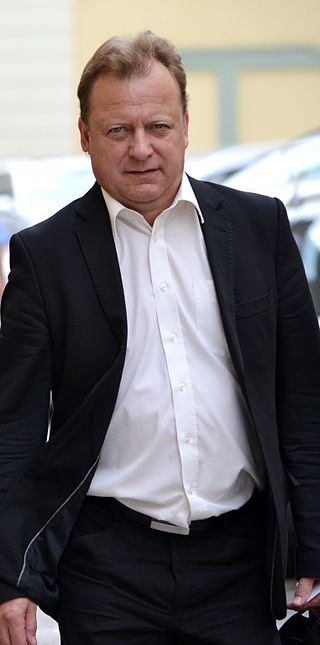
Pavel Ploc is a Czech former ski jumper who competed for Czechoslovakia, winning two Olympic medals.
Reinhold Bachler is an Austrian former ski jumper. He was born in Eisenerz, and competed from 1968 to 1978.
Christof Duffner is a West German/German former ski jumper.
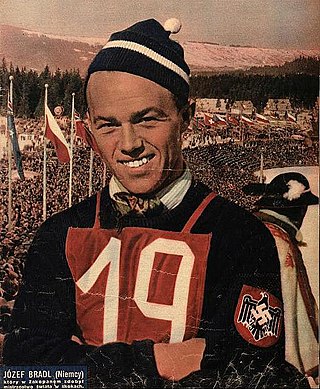
Josef "Sepp" / "Bubi" Bradl was an Austrian ski jumper who competed during the 1930s and 1950s. He was born in Wasserburg am Inn, Bavaria.

Jan Mazoch is a Czech former ski jumper. He became a regular member of the Czech national team in 2003. Mazoch was a member of the Czech delegation at the 2002 and 2006 Winter Olympics.

Letalnica bratov Gorišek is one of the two largest ski flying hills in the world and the biggest of eight hills located at the Planica Nordic Centre in Planica, Slovenia.
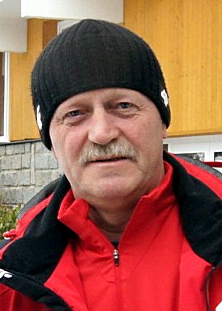
Piotr Fijas is a Polish former ski jumper.
Zbyněk Krompolc is a Czech former ski jumper who competed from 1994 to 1999. At the 1994 Winter Olympics in Lillehammer, he finished seventh in the team large hill and 29th in the individual large hill events.

Alexandria Loutitt is a Canadian ski jumper. She is the first ski jumper from Canada to win a gold medal at the World Championships and the first Canadian woman to win a World Cup individual competition.













